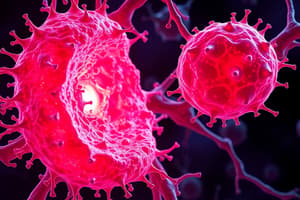Podcast
Questions and Answers
What characterizes invasion in tumor biology?
What characterizes invasion in tumor biology?
- Tumor cells remain in a localized mass.
- Tumor cells migrate in a cohesive manner.
- Tumor cells spread exclusively through lymphatic channels.
- Tumor cells penetrate blood vessels. (correct)
Which type of tumor is associated with the ability to metastasize?
Which type of tumor is associated with the ability to metastasize?
- Neurofibromas
- Benign tumors
- Malignant tumors (correct)
- Pre-cancerous lesions
What is the primary distinction between benign and malignant tumors regarding growth?
What is the primary distinction between benign and malignant tumors regarding growth?
- Benign tumors lack the ability to infiltrate. (correct)
- Malignant tumors do not have localized growth.
- Malignant tumors remain cohesive masses.
- Benign tumors invade surrounding tissues.
What is a key component of the extracellular matrix (ECM) that tumor cells degrade to facilitate invasion?
What is a key component of the extracellular matrix (ECM) that tumor cells degrade to facilitate invasion?
What is the first step in the metastatic cascade?
What is the first step in the metastatic cascade?
Which characteristic is true of the metastatic process?
Which characteristic is true of the metastatic process?
What is the primary role of cadherins in normal cells?
What is the primary role of cadherins in normal cells?
What changes occur in cancer cells that affect cell adhesion?
What changes occur in cancer cells that affect cell adhesion?
What is a function of integrins in cells?
What is a function of integrins in cells?
What does the reduction of integrins in cancer cells lead to?
What does the reduction of integrins in cancer cells lead to?
Which family of proteins is primarily involved in intercellular adhesion?
Which family of proteins is primarily involved in intercellular adhesion?
What role do proteases play in tumor cell behavior?
What role do proteases play in tumor cell behavior?
What is the relationship between catenins and cadherins?
What is the relationship between catenins and cadherins?
What triggers the synthesis of more enzymes by fibroblasts in the tumor environment?
What triggers the synthesis of more enzymes by fibroblasts in the tumor environment?
What is the significance of lymph node involvement in cancer?
What is the significance of lymph node involvement in cancer?
Which of the following sites is most commonly involved in hematogenous metastasis?
Which of the following sites is most commonly involved in hematogenous metastasis?
What type of cancer is most likely to cause brain metastasis?
What type of cancer is most likely to cause brain metastasis?
Which condition causes an obstruction in hollow viscera due to malignant tumors?
Which condition causes an obstruction in hollow viscera due to malignant tumors?
Which process describes the spread of tumor cells to body cavities?
Which process describes the spread of tumor cells to body cavities?
What effect do benign tumors generally have on surrounding tissue?
What effect do benign tumors generally have on surrounding tissue?
What is one of the primary roles of matrix metalloproteinases (MMPs) in tumor invasion?
What is one of the primary roles of matrix metalloproteinases (MMPs) in tumor invasion?
Which MMP is known as a gelatinase that cleaves type IV collagen?
Which MMP is known as a gelatinase that cleaves type IV collagen?
How do receptors, like integrins, contribute to the state of normal epithelial cells?
How do receptors, like integrins, contribute to the state of normal epithelial cells?
What is one reason why not all malignant cells metastasize?
What is one reason why not all malignant cells metastasize?
What type of spread is most common for the initial dissemination of carcinomas?
What type of spread is most common for the initial dissemination of carcinomas?
What is a characteristic feature of tumor cells in relation to cell death?
What is a characteristic feature of tumor cells in relation to cell death?
Which type of cell migration involves numerous cells moving together?
Which type of cell migration involves numerous cells moving together?
What is required for the migration of tumor cells through degraded basement membranes?
What is required for the migration of tumor cells through degraded basement membranes?
Which pathway is NOT associated with metastasis?
Which pathway is NOT associated with metastasis?
What effect do cleavage products of matrix proteins have on tumor cells?
What effect do cleavage products of matrix proteins have on tumor cells?
Flashcards are hidden until you start studying
Study Notes
Invasion and Metastasis
- Invasion refers to the ability of tumor cells to break through the basement membrane and invade surrounding tissues, distinguishing malignant tumors from benign ones, which remain localized.
- Metastasis indicates tumor spread to distant sites, signifying malignancy and requires tumor cells to undergo a series of steps known as the metastatic cascade.
- The metastatic cascade includes: loosening cell-cell interactions, degrading extracellular matrix (ECM), attaching to new ECM components, and migrating to secondary sites.
Tumor Cell Invasion Mechanisms
- Tumor cells detach from each other due to changes in intercellular adhesion molecules, particularly cadherins which typically bind normal cells together.
- Integrins play a crucial role in cell adhesion and migration; reduced expression allows tumor cells to move more freely.
- Tumor cells degrade the basement membrane and interstitial connective tissue through protease enzymes like Matrix metalloproteinases (MMPs), which facilitate invasion and release growth factors from the ECM.
Pathways of Metastasis
- Metastasis occurs primarily via three pathways:
- Lymphatic spread, common for carcinomas.
- Hematogenous spread, typical for sarcomas.
- Direct seeding into body cavities (e.g., Krukenberg tumors).
- Lymphatic spread leads to cancer cells in draining lymph nodes, critical for disease staging and therapy selection.
- Hematogenous spread mainly targets the liver, lungs, bone marrow, and can occur in various malignancies including carcinomas and sarcomas.
Local Effects of Tumors
- Benign tumors generally cause local effects such as compression, atrophy, altered function, and obstruction of hollow viscera.
- Malignant tumors destroy surrounding tissue, invade nerves and blood vessels, and cause ulceration.
Systemic Effects of Neoplasms
- Cancer cachexia features progressive weight loss, weakness, and increased metabolic rate despite poor food intake.
- Hematological effects include anemia from ulceration or infiltration of bone marrow, alongside leukopenia and thrombocytopenia due to infiltration or treatment.
- Endocrine disturbances can arise from excessive hormone secretion or ectopic hormone production from neoplasms, leading to syndromes like Cushing’s disease.
Neuromuscular and Skin Effects
- Neuromuscular symptoms include balance problems, sensory/motor neuropathies, and myopathy.
- Skin manifestations can include increased pigmentation, pruritus, and conditions such as dermatomyositis.
Paraneoplastic Syndromes
- These syndromes involve symptom complexes that are not easily explained by the tumor's local or systemic effects, potentially being the first indicator of an occult neoplasm.
- Types of paraneoplastic syndromes include:
- Endocrinopathies, especially Cushing's syndrome resulting from ectopic hormone production.
- Hypercalcemia due to osteolysis from cancer or humoral substances from neoplasms.
- Skin changes, such as acanthosis nigricans, noted by gray-black patches in skin folds.
Studying That Suits You
Use AI to generate personalized quizzes and flashcards to suit your learning preferences.




